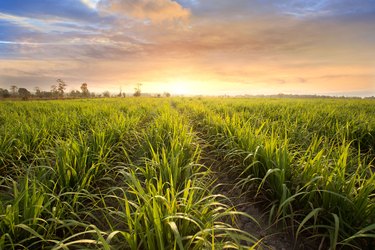Discovering Sugarcane Products: Versatile Utilizes and Benefits
The expedition of sugarcane products exposes a remarkable array of applications that extend well beyond the familiar world of sweeteners. As we take a look at the diverse contributions of sugarcane, one might question how these diverse uses can improve markets and way of livings in a swiftly progressing world.
Summary of Sugarcane
Although sugarcane is usually connected primarily with sugar production, it is a versatile crop with an abundant history and many applications. Grown in subtropical and exotic areas, sugarcane flourishes in well-drained soils and warm climates, adding dramatically to several economic climates worldwide. This perennial grass, coming from the genus Saccharum, can grow to heights of approximately 4 meters, showcasing its robust nature.
Past its primary role in sugar removal, sugarcane acts as a crucial source for numerous byproducts. The coarse residue, called bagasse, is utilized for creating bioenergy and as a basic material for making paper and naturally degradable items. Furthermore, molasses, a spin-off of sugar refining, is rich in nutrients and generally utilized in pet feed and fermentation processes.
Sugarcane likewise plays a substantial duty in conventional medications and social methods in several areas, highlighting its relevance beyond business usage (sugarcane product). In addition, with the increasing concentrate on sustainable agricultural methods, sugarcane is being discovered for its potential in biofuels and carbon capture, positioning it as a principal in the shift towards renewable resource resources. Thus, the convenience of sugarcane expands far past the boundaries of sugar production
Sugarcane in Food Products


Beyond sweeteners, sugarcane is the source of energy-rich items such as jaggery and panela, which are traditional unrefined sugars used in lots of cultures. These items not just sweeten foods yet likewise impart one-of-a-kind flavors and dietary benefits.
Sugarcane juice, a rejuvenating drink appreciated in several tropical regions, showcases the plant's flexibility. It is commonly consumed fresh or fermented into alcoholic drinks like rum.
In addition, sugarcane fibers, called bagasse, are often used to develop food packaging products, highlighting the ecological benefits of sugarcane handling. Generally, sugarcane's contribution to food items is complex, enhancing tastes, providing nutritional worth, and playing a considerable role in cooking traditions around the globe.
Industrial Applications of Sugarcane
In numerous industries, the convenience of sugarcane expands far past its culinary applications. Sugarcane works as a critical raw material in the manufacturing of biofuels, specifically ethanol, which is increasingly used as a renewable power resource. This biofuel is derived via fermentation and purification procedures, giving a sustainable alternative to fossil fuels and adding to a decrease in greenhouse gas discharges.

Moreover, the sugarcane sector has located applications in drugs, where its components are utilized in the formulation of various medicinal items. The all-natural substances removed from sugarcane exhibit antioxidant and antimicrobial residential or commercial properties, enhancing the efficacy of certain medications.
Finally, sugarcane is essential to the manufacturing of a variety of chemicals, including glycerol and organic acids, which are crucial for numerous industrial procedures. These applications highlight sugarcane's significant role in advertising commercial sustainability and development.
Ecological Benefits of Sugarcane
The diverse applications of sugarcane not only enhance commercial procedures however additionally add substantially to environmental sustainability. As an eco-friendly resource, sugarcane cultivation plays an important function in carbon sequestration, soaking you can find out more up considerable quantities of co2 from the environment. This procedure aids mitigate climate adjustment by minimizing greenhouse gas concentrations.
In addition, sugarcane results, such as bagasse and molasses, provide eco-friendly choices to standard materials. Bagasse, the coarse residue after juice removal, can be made use of as a biomass gas, lowering dependence on fossil gas and advertising cleaner energy sources. In addition, molasses can be changed right into bioethanol, further sustaining lasting energy efforts.
Sugarcane farming likewise promotes biodiversity and dirt wellness. Sustainable farming methods, such as intercropping and plant rotation, boost soil fertility and minimize erosion. Furthermore, you can find out more the plant's deep root system help in water retention, therefore sustaining regional communities and enhancing resilience versus dry spell.
Wellness Advantages of Sugarcane
Rich in natural sugars and essential nutrients, sugarcane supplies countless wellness advantages that make it a valuable enhancement to a well balanced diet regimen. Its high fiber content aids in food digestion, advertising gut health and wellness and preventing constipation. Additionally, sugarcane is a More hints resource of antioxidants, which combat oxidative tension and may reduce the danger of persistent illness.
In addition, sugarcane juice is understood for its hydrating buildings, making it a superb drink choice, particularly in hot environments. The natural sugars existing in sugarcane offer a quick power increase, valuable for professional athletes and those involved in exercises. It additionally contains crucial nutrients, such as vitamin C, potassium, magnesium, and calcium, which add to total health.
Researches recommend that sugarcane may assist control blood glucose degrees, making it a more effective sweetener for people with diabetes when consumed in moderation. Its anti-inflammatory residential or commercial properties can sustain liver wellness and help in cleansing.
Final Thought
In final thought, sugarcane becomes a highly versatile plant with substantial contributions to different markets. Its varied applications in food, commercial uses, and environmental sustainability underscore its relevance. The byproducts of sugarcane, such as bagasse and molasses, facilitate green practices, while its health advantages boost total well-being. The complex nature of sugarcane not only sustains economic growth however likewise advertises lasting advancement, highlighting its worth in modern society.
Although sugarcane is commonly linked largely with sugar manufacturing, it is a functional plant with an abundant background and countless applications.Beyond its primary role in sugar removal, sugarcane offers as an important resource for various by-products. Mostly understood for producing sugar, sugarcane is transformed right into granulated sugar, brownish sugar, and molasses, each offering distinct culinary functions.Rich in natural sugars and vital nutrients, sugarcane offers numerous health advantages that make it a valuable addition to a well balanced diet plan. The all-natural sugars present in sugarcane give a quick energy increase, valuable for professional athletes and those involved in physical activities.